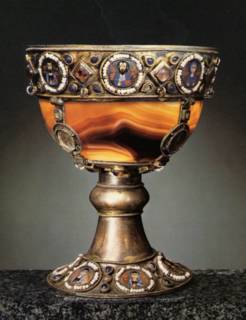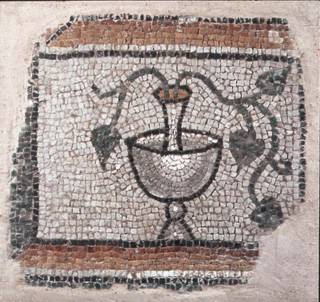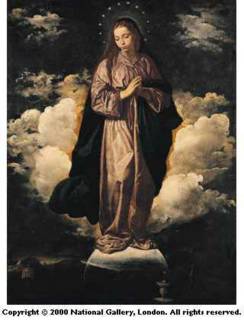Sermon for All Souls
Its about the year 50 A.D. The apostle Paul has just received a disturbing letter from one of his favorite congregations, the church at Thessalonica. That church, it seems, was in crisis and the faith of its fledgling Christians was in jeopardy. You see, Christians were dying. I don’t mean that they were being martyred for the faith or dying in particularly horrible ways. But dying they were.
Now this wouldn’t surprise you and me. We have all known faithful Christians who have died. That is why we are here tonight for the feast of All Souls, after all. But in 50 A.D. the Thessalonian church did not expect their Christian family and friends to be dying. What they were expecting—and eagerly—was the return of our Lord Jesus Christ on clouds of glory with his holy angels. They expected the Second Coming to happen any day. But something was wrong. Christ had not yet returned and Christians were dying in the meantime. “How could this happen? What did it mean? Will our dead friends miss out on the coming Kingdom?” they asked their beloved apostle.
Our reading from 1 Thes tonight gives Paul’s answer. He encouraged our ancient forebears in the Faith that they may not grieve “as others do who have no hope.” “For since we believe that Jesus died and rose again,” the apostle says, “even so, through Jesus, God will bring with him those who have fallen asleep.” This is “the word of the Lord.” “We who are alive, who are left until the coming of the Lord, shall not precede those who have fallen asleep. For the Lord himself will descend from heaven with a cry of command, with the archangel's call, and with the sound of the trumpet of God.” On that glorious day, Paul says, “the dead in Christ will rise first; then we who are alive, who are left, shall be caught up together with them in the clouds to meet the Lord in the air; and so we shall always be with the Lord.” It doesn’t matter how long the Lord tarries to return. The faithful departed will not miss out on the fruits of resurrection life. “Comfort one another with these words,” Paul writes. More than 1950 years later we are still doing so.
Paul can confidently answer the Thessalonians’ anguished plea because he knows the Master he serves is the Master of life and death. We have just heard the Lord Jesus himself make this clear: “As the Father has life in himself, so he has granted the Son also to have life in himself, and has given him authority to execute judgment, because he is the Son of man.” Christ has life in himself, and he offers it to us. Trust in his word is the foundation of eternal life. “Truly, truly,” Christ tells us, “he who hears my word and believes him who sent me, has eternal life; he does not come into judgment, but has passed from death to life.” The old categories of life and death become meaningless in the light of the gospel of Jesus Christ. His voice—his word—is the source of new and unending life in Him. "The hour is coming, and now is, when the dead will hear the voice of the Son of God, and those who hear will live.” Did you catch that? The hour is coming in the future, and now is at present, when the voice of Jesus Christ makes the dead live! The once impenetrable barrier between life and death has been shattered by the coming of the Son of Man. Time as we normally experience it—past, present, and future-- falls away before the gift of eternal life. “The souls of the righteous are in the hand of God,” and “their hope is full of immortality.”
We are gathered here tonight to offer the Holy Eucharist to the greater glory of God, with special intention for the souls of all the faithful departed. For more than 1000 years Christians have set aside a special day of the liturgical year to commemorate all those members of their communities who have left this earthly life behind. This Eucharist for All Souls, and the great feast of All Saints next Sunday with which it is paired, remind us powerfully that the unity of Christ’s Church truly transcends space and time. Every Sunday at Mass we profess that we believe in “the communion of saints.” Tonight and next Sunday will make that invisible communion manifest in a special way. Tonight we are reminded that every Christian who ever drew breath is as much a part of the Church today as the day he or she was baptized. Those who have died are very much still members of Christ’s Body. Because of God’s gift of eternal life they will never be parted from our fellowship. That is what it means to share in the communion of saints. Death and the grave cannot impede our care for a brother or sister in Christ, so we gather here tonight to lift the faithful departed up in prayer. And should it please the Lord Jesus to delay his coming again in glory until after you and I have also passed from this earthly life, future generations of Christians will lift us up before the throne of glory in Masses like this one until the consummation of the age. “Comfort one another with these words.”
Tonight we shall pray for brothers and sisters in Christ who are dear to us—for family, friends, neighbors, colleagues--and for many more whose names we probably won’t even recognize. Tonight we shall pray that God will bring his great work in the lives of the faithful departed to its magnificent conclusion. During their earthly lives they (like us) had begun to be conformed by the Holy Spirit to the image of Christ. Many of them, no doubt, had gone far down the path to holiness during their lifetimes. Others among the redeemed may have made only baby steps toward sanctification before they were called home. Our prayer tonight—the Universal Church’s prayer tonight--is that all these faithful brothers and sisters may stand before God with unveiled faces, loving and serving him in the fullness of resurrection life, being fully conformed to the Image of God in Christ Jesus our Lord. May whatever was broken or lacking in this life through the mercy of God be made whole and full in the next. May their hearts and minds be fitted to behold the beatific vision of the glory of God. And may we also come to share with them in His Heavenly Kingdom.
In a few moments we shall approach our Lord’s altar and offer our sacrifice of praise and thanksgiving. Christ’s once-for-all sacrifice of himself will be re-presented for our benefit and that of all his holy Church. And I mean all of Christ’s Church, in this world and the next. The communion of saints is never more tangible than it is in the Mass. In words that stretch back into Christian antiquity, the celebrant will exhort us to lift up our hearts and together we shall lift them to the Lord. In this sacramental action our hearts will be raised up to the heavenly throne, into the presence of the living God. Here at this altar tonight—and at thousands of other altars around the world--the barrier between heaven and earth becomes permeable. Our hearts will join the heavenly host in giving thanks and praise to Almighty God and Christ will become really present in the Blessed Sacrament. This is where heaven and earth meet. We shall sing the Sanctus with “angels and archangels and all the company of heaven.” We will rejoice in our fellowship with the ever-blessed Virgin Mary, blessed Vincent our patron, and all the great luminaries of the Faith who have entered into joy. But it is not just the great exemplars of our Faith with whom we share our worship tonight. We share this foretaste of the heavenly banquet with all those who have died in the communion of Christ’s Church, as well as those whose faith is known to God alone. When we, the Church Militant on earth, kneel in wonder before the Body and Blood of our Savior Jesus Christ, the Church Expectant in paradise and Triumphant in glory joins with us in adoration. The hour is indeed coming and is now here when the dead will hear the voice of the Son of God—“This is my Body … this is my Blood, given for you”—they and we will hear … and live!
I would like to close this reflection with a prayer of St. Therese of Lisieux. This prayer captures something of our hope tonight for the faithful departed, our sure and certain hope that they be enraptured in the love of God for all eternity, with every impurity refined away and every deficiency made whole from his abundance. It is the same hope that impels us forward in our own walk with Christ. As many of you know, Therese of Lisieux was a young Carmelite sister who composed one of the great spiritual autobiographies of modern times, “The Story of a Soul,” which was written shortly before her own death from tuberculosis in 1897. Therese composed this prayer a few weeks before she passed away at the age of twenty-four. Her body was wracked with pain, but her spirit seems already to be soaring with the hosts of heaven. Let us join with Therese in prayer:
"O eternal Word, my Saviour, You are the Eagle I love and the One who fascinates me. You swept down to this land of exile and suffered and died so that You could bear away every soul and plunge them into the heart of the Blessed Trinity, that inextinguishable furnace of love. You re-entered the splendours of heaven, yet stayed in our vale of tears hidden under the appearance of a white Host so that You can feed me with Your own substance. O Jesus, do not be angry if I tell that Your love is a mad love ... and how can You expect my heart, when confronted with the folly, not to soar up to You? How can there be any limit to my trust?" Amen.











